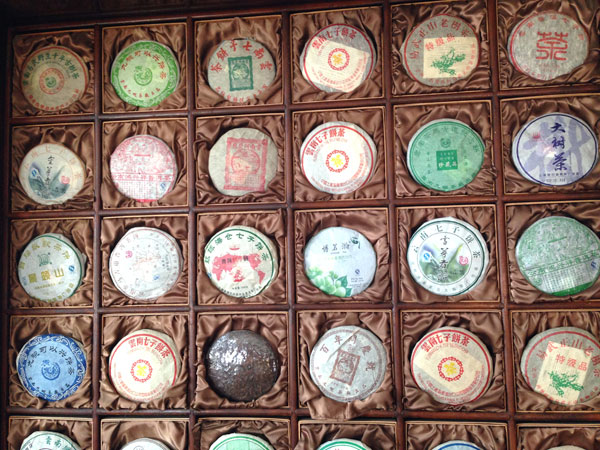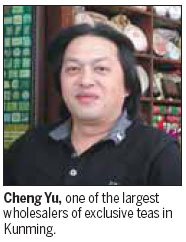The new tea party
 |
|
Cakes of pu'er tea are collector's items, carefully kept and aged like fine wines. [Photo/China Daily] |
Even outside China, specialist teashops are mushrooming all over the United States, Europe, Australia and even Africa.
They sell loose-leaf teas in boutiques that are educating the world on how to appreciate teas like Dragon Well tea plucked before the spring rains, monkey-harvested silver needles, peony-scented white teas and the furry buds of the gigantic ancient pu'er tea trees from southern Yunnan.
 |
|
|
In fact, he is so respected that he is quoted often in the locally published Encyclopedia of Yunnan Tea, where his family business has an entire chapter to itself.
Ed Grumbine, 56, a research scholar with the Chinese Academy of Sciences at the Kunming Institute of Botany, was drinking black tea from China back in the United States long before he arrived to work here.
As soon as he had settled in Kunming, he started exploring the city's famous wholesale tea markets, which are more like tea towns. He soon found a tutor in Cheng Yu.
Grumbine took us to visit Cheng recently, and it proved an extremely educational experience.
There was a huge motorcycle outside Cheng's shop, a 1,800-cu-cm monster with upholstery that looked as if it was hijacked from a car. Images of Jack Kerouac on the road in designer jeans refuse to fade.
Indeed, when we meet Cheng, he looks more like a Beat Generation poet than a tea merchant, with long wavy locks and an easy confidence culled from a lifetime in the business. And he is wearing designer jeans.
We are invited to join him for tea at the table that is a fixture in every tea merchant's shop in Yunnan, with its supply of water at hand and a kettle almost constantly on the boil. The pu'er Cheng was drinking was very mellow - its natural tannins so tempered by age that it slid smoothly down the throat like the finest silk.
![[Photo provided to China Daily] The new tea party](../../images/attachement/jpg/site1/20130728/eca86bd9ddb4135ec68508.jpg) |
|
[Photo provided to China Daily] |
As we settle, he cues the two young ladies brewing tea to make a new pot. This time, the fragrance wafts up as soon as the hot water hits the leaves, and the room is scented with the unmistakable bouquet of jonquils, daffodils, narcissus - whatever you called the flower.
"This is a tea that has been recently developed," Cheng says, adding that it first came out around 2005.
It's a very floral black tea named zhongguohong, or China Red, linking it to a much older sister, the traditional dianhong cha, or Yunnan Red.
It is a tea very much in demand, but the harvest is small, and Cheng is reluctant to part with too much. The asking price here is 400 yuan per 100 grams, but by the time it is retailed abroad, the price may be $400. Even in Beijing, where small amounts are sold in the tea distribution center of Maliandao, the cost will be double what it is in Kunming.
This is a fair indication of how tea-buying habits are changing.
The most expensive teas are now finding a market, and so Qimen red tea is no longer exclusively for the Queen's afternoon cuppa, for example, but is offered in the specialist tea bars of international hotel chains all over the world.
There are some teas that can be drunk young, such as green teas or the jasmine teas so popular in the hutong courtyards of Beijing.
Tea is generally divided into black, red and green. The categories refer more to their processing rather than their color. The varieties are vast, and, like wine, different terroir also produce different tastes, aromas and colors.
There is a quiet revolution going on now that involves not only Chinese tea drinkers but also those abroad.
More Westerners are getting in on the act and developing a sophisticated taste for tea - without sugar or milk, if you please.
Registration Number: 130349



























